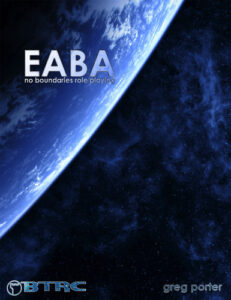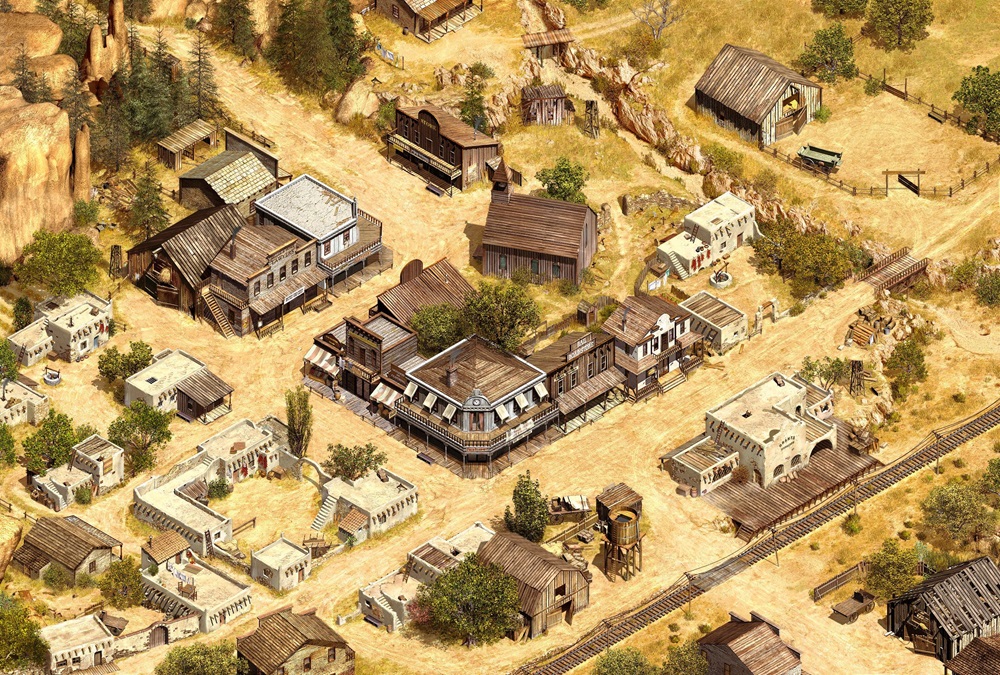Nils had a request for play for our Spelens Hus group, and it was highly specific. You’ll probably spot the influences: post-apocalyptic wasteland, retro Wild West, harsh, gritty, moody, occasional ancient tech (which is pretty much our own real-world tech), grotesque or offbeat elements which are treated in the fiction as naturalistic. He mostly knows it from digital gaming, I mostly know it from the source fiction, and we share experience with a fair amount of associated movies.
I gathered some pictures to see if I was on the right track, and Nils said, “Exactly that.” The idea is not the actual 19th century continuing into this fiction or somehow being recapitulated, so much as the wreckage of our own real-life becoming analogous to various “western” features, whether fictional or historical.

He and I also reviewed some candidate games, and since his top priority was naturalism and grit (“counting ammunition and getting tired”), we settled on EABA, or “End All Be All,” by Greg Porter. There’s some history for me in the game, as Greg was an active participant at the Forge booth for most of its time. It is an explicit extension of GURPS and the Hero System with an eye toward immense playability once all the numbers have hit the papers.

You can find the current version and a lot of support material here, but I am using the original version as that’s the one I have.
I am somewhat less interested in claims to realism and “well it would work this way” logic toward the fictional physics, because I find them easy to play, and more interested in the game’s strong situational placing for player-characters, its generally workable framing devices for what sort of fiction we’re talking about (which is different from and better than those tedious genre summaries from the two titles mentioned above), and the evident desire in its published source material to disturb or provoke ideas.
That’s why the very first thing I worked up, well before character creation, were these system options: the all-important Status categories (e.g., the interplay among Status: Mutant, Secret, and Gifted: Powers), the array of modifiers to apply (in this case, mostly about damage, fatigue, and environment), and the specifics for technology.
I’ll explain that interplay better: that Secret is defined as a Weakness or other +numbers feature, i.e., it gives you more points equal to whatever that feature would give you if you had it … and if people find out your Secret, why then, you will have it. So for us, if you take Secret as being a mutant, then it’s the same points as you’d get for having Status: Mutant (the lowest stratum), because that’s what your Secret will turn into if you’re found out. In either case, you are eligible to have Gifted: Powers; if you are a known mutant, it’s likely you also have Cursed defined as ruining your appearance to greater or lesser degree.
For example, the players’ concepts interfaced incredibly well with the formal points and procedures of character creation.
- Dr. Michael Bennett, secretly a mutant immune to infection, grieving at the loss of his wife to a plague (Filip)
- Henry Britten, a many-eyed mutant scavenger who understands the strange old tech better than anyone (Neo)
- Joseph Harrison, a former hard-living courier who’s settled down to be a law-abiding gunsmith (Theo)
- Bob, a mutant member of an outlaw-ish community/tribe (Arvid)
- Arvid didn’t make it to the first session, so his writeup in these materials isn’t developed; he did provide information that brings Bob up to par, but I need to review it with him before including it in my notes.
- Horace Humpford, a bounty-hunting drifter (Nils; I was at first concerned that he wanted to hybridize every western anti-hero, but Horace has coalesced into a very specific guy)
If you make characters in this highly Status-centric way, then the Champions influence appears in the necessary situation of play. Once the characters were numerically under way, then I could start preparing things like this:
Session 1
Here’s our first session of play.
I don’t mind telling you that these guys hit a very high standard for proactive, naturalistic play, including insightful and richly-experienced content, and entering into interactions that go anywhere. You can hear it catch fire in the recordings. When I perceived it in play, as you’ll hear about halfway through the session, I took a moment to acknowledge my admiration for the concepts they’d introduced and their capacity to play them proactively. Then I announced that my prepared scene/start activity had formally ended, and from now on, we merely played whatever their characters and my characters decided to do.
The best method for play of this sort, for me, is what I developed long, long ago, and formalized as The Now in later work. Here’s what I have after the first session. Note that Bob and associated content isn’t developed, so it’s in red to remind me to do so before using this in play; I bolded the text which indicates specific player-characters activity during play.
Session 2
See the corresponding comment below for thoughts & materials; discuss please.
Session 3
See the corresponding comment below for thoughts & materials; discuss please.


4 responses to “Apoc western”
I love these recordings.
The style of play, content, and tone are very reminiscent of a lot of the best play I experienced in the 90s with my friends.
A lot of that play was quite spontaneous in my case, with a game we either knew well and/or one that was inspired by source material that we all loved.
Our play also had the quality of the GM really stepping back in terms of the backdrop, lore, and genre. As in “we all get it, we know it already, we’ve read the same books and seen the same movies”, but with none of the strict genre conformance that seems baked into many newer games. Listening to these recordings and reminiscing about this past play experience really drives home the genre vs idiom distinction for me.
Anyhow, I really appreciate it and feel inspired by it. And of course, naturalistic post apocalypse and westerns are my totally my thing.
What were some of the source materials you were all inspired by? I’d love to add them to my reading/viewing/playing list if they are new to me.
Thanks for the kind words! I wasn’t sure whether the most positive aspects of the experience would come through on audio alone. For example, you can’t see how the more soft-spoken participants build up to what they say via glances and confirmatory interactions, or how, when they’re talking, other people pick up what they’re saying in the same way. It only shows up in audio in ways which can be misinterpreted, e.g., when Theo shared his thoughts about unsuccessful rain in the wasteland – you can’t see Neo and Nils, whose characters were directly affected by it, giving confirmation that it’s exactly right for how they see it too.
As for influences, well, I’m actually trying not to think about it, especially since during character creation I asked everyone to stop shouting out the names of various digital games that Nils was obviously drawing upon. I wanted to get us all to stop caring where this or that feature came from, and to focus on what it meant or how it would be for us. I can say that my own aesthetics’ time-boundaries are clear: quite firmly in rather edgy pre-1950s western films, then the Siegel-Eastwood westerns and several Italian equivalents like the original Django, nodding toward the 1970s nasty side like A Boy and His Dog (story), up to and only barely including The Road Warrior (1981), and definitely not Mad Max: Beyond Thunderdome (1986). All of this stuff is quite raw and I doubt I’ll be playing it that hard, but that’s kind of what’s feeding into it. Part of that for me is playing a lot of the people as actually pretty decent, so a little bit of the hard stuff will go a long way.
SESSION TWO
Here are my files to consider: preparation notes and the scribbled-on Now. That’s usually how I do it: make a file, print it, and then mark it up for play.
SESSION THREE
Now that things are rolling along, all I need to do is keep updating the Now, and to make sure I have the right numbers for the various people and things in play. After this session, I realized I’m behind on that latter point, so I’m busy writing up people like Jesh Hickey and Sabe, as well as some we haven’t seen yet, like Captain Dewey.
As usual, I wish you could see video for these. The grin Nils flashed when I was role-playing Sally Huxtable was worth everything.